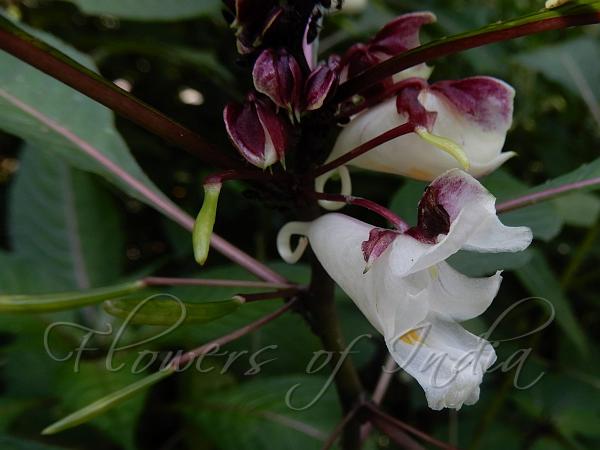|
| Roing Balsam |
|

|

| File size | 234203 |
| Original date | 5/29/19 2:09 PM |
| Resolution | 1488 x 1116 |
| Flash | Flash did not fire, auto |
| Focal length | 4.3mm |
| Exposure time | 1/100s |
| Aperture | 3.4 |
| Focus Distance | |
| Metering Mode | Center weighted average |
| Camera make | NIKON |
| Camera model | COOLPIX A900 |
| Sensor type |
|
|
|
|
Photo: |
Botanical name: Impatiens roingensis Family: Balsaminaceae (Balsam family)
Roing Balsam is an annual herb, up to 50-60 cm tall.
It is a newly discovered species, described in 2016.
It is named after the Roing town in Lower Dibang Valley, Arunachal Pradesh.
Flowers are borne in leaf-axils, in 2- or 3-flowered clusters; bracts
2-3 mm long, linear. Flower-stalks are 1.5-2.5 cm long, hairless, pale
green or pale pink. Flowers are 3.4-3.6 x 2-2.2 cm, white, with yellow
spot in throat; lateral sepals 4, hairless, pale green or pale pink.
Outer sepals 2, 3.5-6 x 2.5-3 mm, ovate, tip tapering; inner sepals 2,
2.5-3.5 x 2-2.5 mm, nearly ovate, tip tapering. Dorsal petal 1.3-1.5 x
1.3-1.6 cm, broadly ovate, above slightly keeled, hairless, white, beak
not prominent or absent; keel with a short sharp point; mucro about 0.2
mm long; lateral united petals 2.6-3 x 2.5-2.8 cm, two-lobed; basal
lobe 8-10 x 5-7 mm, ovate, tip blunt, white; distal lobe 15-18 x 6-8
mm, oblong, tip rounded or blunt, white; dorsal ear 3-4 x 2 mm,
rounded; lower sepal 1.6-2.0 x 1.2-1.5 cm, funnel-shaped, with shrunken
middle part, hairless, white with yellow spot within; spur 1.4-1.6 cm
long, cylindrical, deeply curved, tip notched, hairless, pale yellow or
white. Stem is nearly round, hairless, green; internodes 4-8 cm long,
green, hairless. Leaves are alternate, stalked; leaf-stalk 1-5.5 mm
long, with glands, hairless, pale green. Leaf blade is 5.5-14 x 1.8-5.8
cm, ovate-elliptic, base wedge-shaped, margins deeply sawtoothed,
serrations apiculate, tip tapering, green, leathery, below pale green,
above dark green; lateral nerves 9 or 10 on each side, prominent.
Capsules are ellipsoid, 3-3.6 x 0.5-0.7 cm long, hairless, green;
seeds, 2-3 x 1.5-2 mm, obovoid. Roing Balsam is known only from the
lower Dibang Valley district of Arunachal Pradesh. Flowering:
May-September.
| Identification credit: Tabish | Photographed in East Siang district, Arunachal Pradesh. |
• Is this flower misidentified? If yes,